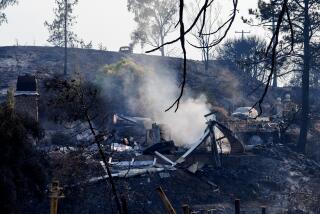Cal/OSHA chief will oversee criminal probe of UCLA lab fire
The head of California’s Division of Occupational Safety and Health said Monday he will personally oversee a “rigorous and effective” criminal investigation into the Dec. 29 chemistry lab fire that killed a UCLA staff research assistant.
Cal/OSHA Chief Len Welsh’s pledge came after a civil probe last month resulted in one regulatory and three “serious” violations, and fines totaling $31,875. The family of the research assistant, Sheri Sangji, had criticized the review as inadequate.
“I can’t tell you what the results will be right now, but I can tell you we are reviewing everything from the very beginning of this inspection and we will take appropriate action,” Welsh said Thursday in a voice-mail message to Sangji’s sister, Naveen.
But Welsh, who confirmed that he had left the message, said Monday that any future action would not include harsher civil penalties against UCLA, as the family had sought.
“We have decided not to take any further action in the Cal/OSHA civil case,” Welsh said, adding that a separate investigation into potential criminal liability, common in death cases, is continuing. “The criminal case, right now, is the one people should be looking to.”
If Cal/OSHA finds evidence of a crime, it will turn that material over to the Los Angeles County district attorney’s office.
Sheri Sangji, 23, suffered severe burns over nearly half her body when air-sensitive chemicals burst into flames during an experiment and ignited her clothing. Sangji, who was not wearing a protective lab coat, died 18 days later.
In May, Cal/OSHA issued its citations after concluding that Sangji had not been properly trained and was not wearing protective clothing.
UCLA paid the fines but appealed the violations and sought a stipulation from Cal/OSHA that the school admitted no fault in connection with the findings -- a legal move aimed at limiting liability.
The university withdrew its appeal Friday, however. Kevin Reed, vice chancellor for legal affairs, said Monday that it was not worth the “hue and cry” it had raised from the family, the union that represented Sangji and others.
“In our view it was not worth the distraction it was causing,” he said. “It was in UCLA’s best interest to withdraw the appeal and move forward, as we have been trying to do since this tragic day happened.”
Reed also accused the family of sending Cal/OSHA a letter “ghost-written by plaintiffs lawyers” in an “effort to get some big judgment at the end of the rainbow here.”
Naveen Sangji, a Harvard medical student, told The Times that she wrote the letter.
Her sister, who had worked in professor Patrick Harran’s organic chemistry lab for less than three months, was transferring up to 2 ounces of t-butyl lithium from one sealed container to another when a plastic syringe came apart in her hands, spewing a chemical compound that ignites when exposed to air.
Harran and UCLA officials have called it a tragic accident, saying that Sangji had done the experiment before and was using appropriate methods. They also have corrected violations cited by Cal/OSHA, as well as nearly a dozen others noted in an internal inspection of the lab two months before the accident. Most of those had not been fixed by Dec. 29, records show.
Among other things, the family contends that the Cal/OSHA investigator ignored key information that Naveen had relayed to him from her dying sister, including that Sangji had been making three transfers of 50 milliliters each, or about 1.7 ounces.
The investigator’s report, which The Times obtained through a California Public Records Act request, put the volume of t-butyl lithium far lower, at 20 milliliters.
The newspaper also obtained a UCLA fire marshal’s report, which quoted Harran as saying that Sangji probably was transferring 40 to 50 milliliters of the chemical and that a different method would have been preferred for that amount. It remains unclear how much experience Sangji had with such air-sensitive chemicals.
Danny Levin, president of Norac Pharma in Azusa, where Sangji worked between her college graduation last spring and her UCLA job beginning in October, said she did not use the highly volatile chemicals there.
Cal/OSHA subpoenaed Norac earlier this month for information about her training, Levin said, but had not contacted the company during the initial investigation that led to the citations in May.
--
More to Read
Sign up for Essential California
The most important California stories and recommendations in your inbox every morning.
You may occasionally receive promotional content from the Los Angeles Times.











